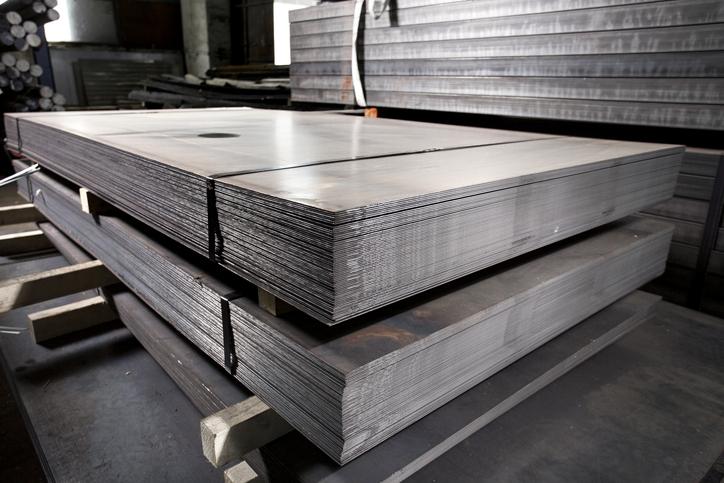Editor-in-Chief
- FMA
- The Fabricator
- FABTECH
- Canadian Metalworking
Categories
- Additive Manufacturing
- Aluminum Welding
- Arc Welding
- Assembly and Joining
- Automation and Robotics
- Bending and Forming
- Consumables
- Cutting and Weld Prep
- Electric Vehicles
- En Español
- Finishing
- Hydroforming
- Laser Cutting
- Laser Welding
- Machining
- Manufacturing Software
- Materials Handling
- Metals/Materials
- Oxyfuel Cutting
- Plasma Cutting
- Power Tools
- Punching and Other Holemaking
- Roll Forming
- Safety
- Sawing
- Shearing
- Shop Management
- Testing and Measuring
- Tube and Pipe Fabrication
- Tube and Pipe Production
- Waterjet Cutting
Industry Directory
Webcasts
Podcasts
FAB 40
Advertise
Subscribe
Account Login
Search
How metal fabricators can keep customers happy, verify the material
What tools are available to help avoid surprises when ordering metal parts?
- By Dan Davis
- February 15, 2023

Different alloys of stainless steel can look similar, but that doesn't mean they are interchangeable. Before a job starts, a metal fabricator might want to check the material to ensure it matches up with the customer-specified alloy. A mobile metal analyzer can help with this task. AlexandruRosu/iStock/Getty Images Plus
Customer satisfaction is of the utmost importance for a metal fabricator. If the customer is happy, the shop can expect more orders coming its way.
But when things go wrong, it causes more than frustration. Mistakes are costly.
Imagine a scenario where an important job comes in, and material is ordered. The material arrives, the job is scheduled, and five days later the parts are ready for delivery to the customer. But when the customer receives the parts and does a check on the metal, it finds the alloy it specified in the original order is not what the parts are made of.
Of course, the main concern is that the customer is upset and, perhaps, has to halt its own production schedule. But the metal fabricator also has to drop everything to pick up the out-of-spec parts, order the correct material, and interrupt current production schedules to accommodate this hot order for the upset customer (not to mention the parts that likely have to be scrapped!). That’s a lot of time and money spent trying to make the order right, but that’s reality when quality is assumed and not verified.
Fortunately, fab shops don’t have to have elaborate quality control departments to avoid this kind of disruption.
Spectro Ametek is offering a webcast on March 30 (1 p.m. CT/2 p.m. ER) that will explain how to take the guessing game out of material identification. Two Spectro experts, Lars Jenster, a product support specialist, and Kyle Rauen, a materials scientist, will discuss the company’s mobile metal analyzers, which provide a complete elemental composition of material. They can be used both for metal entering the shop and completed parts and components leaving the shipping dock—keeping surprises to a minimum.
If you’d like to learn more about this important quality tool, register for the webcast here.
subscribe now

The Fabricator is North America's leading magazine for the metal forming and fabricating industry. The magazine delivers the news, technical articles, and case histories that enable fabricators to do their jobs more efficiently. The Fabricator has served the industry since 1970.
start your free subscriptionAbout the Author

Dan Davis
2135 Point Blvd.
Elgin, IL 60123
815-227-8281
Dan Davis is editor-in-chief of The Fabricator, the industry's most widely circulated metal fabricating magazine, and its sister publications, The Tube & Pipe Journal and The Welder. He has been with the publications since April 2002.
- Stay connected from anywhere

Easily access valuable industry resources now with full access to the digital edition of The Fabricator.

Easily access valuable industry resources now with full access to the digital edition of The Welder.

Easily access valuable industry resources now with full access to the digital edition of The Tube and Pipe Journal.
- Podcasting
- Podcast:
- The Fabricator Podcast
- Published:
- 04/16/2024
- Running Time:
- 63:29
In this episode of The Fabricator Podcast, Caleb Chamberlain, co-founder and CEO of OSH Cut, discusses his company’s...
- Trending Articles
Tips for creating sheet metal tubes with perforations

Are two heads better than one in fiber laser cutting?

Supporting the metal fabricating industry through FMA

JM Steel triples capacity for solar energy projects at Pennsylvania facility

Omco Solar opens second Alabama manufacturing facility

- Industry Events
16th Annual Safety Conference
- April 30 - May 1, 2024
- Elgin,
Pipe and Tube Conference
- May 21 - 22, 2024
- Omaha, NE
World-Class Roll Forming Workshop
- June 5 - 6, 2024
- Louisville, KY
Advanced Laser Application Workshop
- June 25 - 27, 2024
- Novi, MI


























